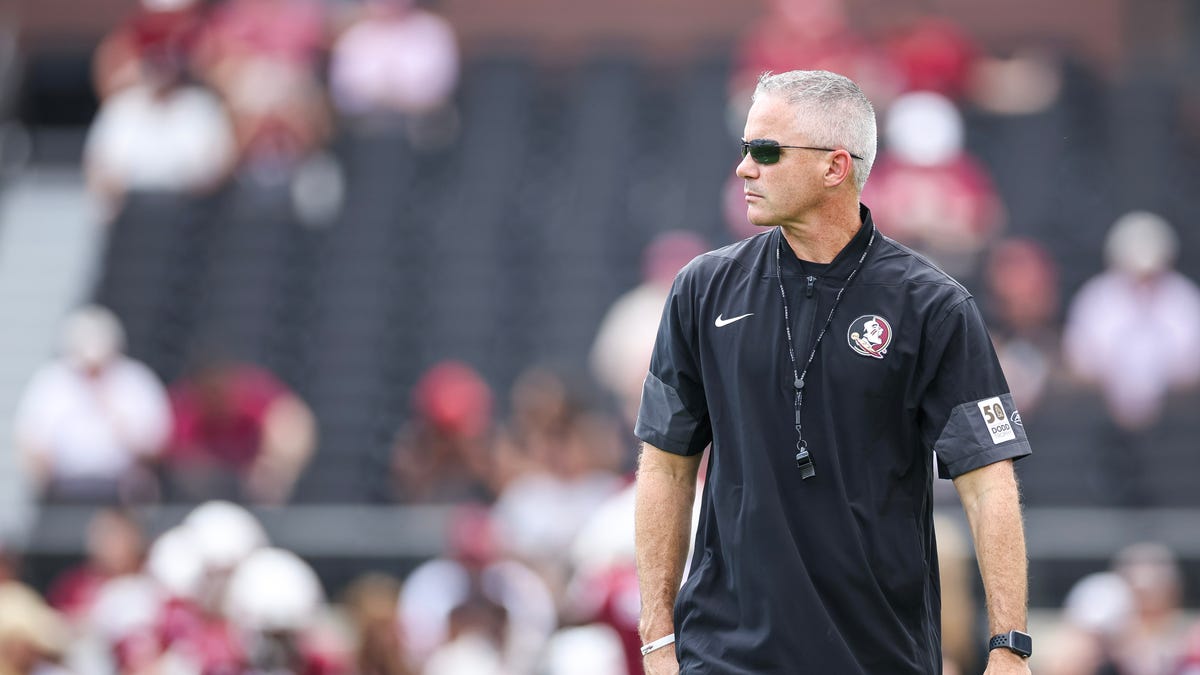Oregon
No. 4 Washington seeks perfection facing Washington State in final Apple Cup as Pac-12 foes

SEATTLE (AP) — Looking back at the on-field celebration of a blowout victory two years ago, the planting of the crimson flag on the purple “W” at midfield was the day the current run of success for No. 4 Washington started.
Even if it came at the hands of watching a rival party on the Huskies’ own field.
“Without that, who knows where we would be right now,” Washington tight end Jack Westover said. “I think it was one of the best things that ever happened to this program. I really do think that. It’s kind of weird saying it that way, but I think without that, I don’t think we’d be where we are right now.”
Where the Huskies are is on the brink of a magical season as they host rival Washington State on Saturday in the Apple Cup in a meeting that’s overflowing with story lines.
It’s the last Apple Cup with both members of the same conference, but the rivalry will continue because the schools reached agreement on a five-year deal to keep playing. It also comes with the sidebar of the schools embroiled in litigation off the field.
But with the subplot of the future taken care of, the focus is squarely on Washington’s chance at history trying to finish off an unbeaten regular season. Washington (11-0, 8-0 Pac-12) moved up to No. 4 in the College Football Playoff rankings this week and seems assured of a semifinal spot with a win over the Cougars and again next week in the Pac-12 championship game. They’ve won 18 straight games, including last week’s 22-20 win at Oregon State, and since losing to Washington State two years ago the Huskies are 22-2.
“Now we got to reclaim our own field, it feels like,” Washington edge rusher Zion Tupuola-Fetui said. “There’s so much that we have to motivate ourselves.”
Washington State (5-6, 2-6) would love nothing more than to blow up the hopes of its rival and pick up a second straight win at Husky Stadium. The Cougars have the motivation of needing a win to reach bowl eligibility and last week rediscovered a little of the magic from their 4-0 start in a 56-14 rout of Colorado that snapped a six-game losing streak.
The Cougars have gone to a bowl in seven straight full seasons, but the only way that streak continues comes by pulling the upset. The last time the Cougars beat a top-five team on the road was 1988 when they knocked off No. 1 UCLA.
“I never understood the impact and the significance of this game until I actually became a Coug,” Washington State wide receiver Lincoln Victor said. “My first year here obviously going to Seattle and winning and storming the field you can see the hope in people’s eyes and really see the impact of what a game can truly do.”
SEEKING PERFECTION
While there is still the matter of what transpires next week in Las Vegas for Washington with the conference championship game, finishing off a perfect regular season would be a rare accomplishment.
Washington has a chance to be the first Pac-12 team to go undefeated in conference play since Oregon in 2010 when it was still the Pac-10. No conference team has finished the regular season unblemished overall since USC in 2004.
“Job is not done. We still got work to do,” Washington coach Kalen DeBoer said.
HEISMAN FINISH
Washington QB Michael Penix Jr. is no longer the Heisman Trophy favorite, but he has a chance these final two weeks to make a final statement. Penix is coming off his worst game of the year statistically against Oregon State, throwing for only 162 yards, although conditions played a role. Last season, Penix threw for 484 yards and had five total touchdowns against the Cougars and he’ll still have the stage of the Pac-12 championship game to make a final push in his Heisman campaign.
THE OTHER QB
If Washington State is to pull off the upset, it’ll need a big game from QB Cam Ward. He did his part last year throwing for 322 yards and had three total touchdowns in the Apple Cup. But that was one of four games in his career at Washington State attempting more than 50 passes and the Cougars are 0-4 in those games. While Ward needs to be solid, the Cougars will also need to find some balance in the run game.
CONFERENCE FINALE
While the series will continue through at least 2028, this will be the final matchup between the schools in the same conference. The pair have been linked as conference brethren dating to the origins of the Pacific Coast Conference and when they meet next year on Sept. 14, 2024, at Lumen Field in Seattle, it’ll be the first time they’ll play outside the months of November or December since 1948.
It’ll be another adjustment in the new landscape for both programs.
“College football is not done changing. Not even remotely close,” Washington State coach Jake Dickert said.
___
Get alerts on the latest AP Top 25 poll throughout the season. Sign up here ___
AP college football: https://apnews.com/hub/ap-top-25-college-football-poll and https://apnews.com/hub/college-football

Oregon
David Pollack reveals pick, score prediction for Oregon-Penn State showdown

Ahead of a massive Week 5 showdown between two of the Big Ten’s primary contenders, Oregon visiting Penn State, college football analyst David Pollack broke down the game and explained which side he’s giving the edge to on Saturday evening.
An episode of Pollack’s podcast, See Ball Get Ball, dropped on Wednesday and featured the former All-American’s picks for the top games of the week, which he paired with some in-depth commentary behind why he’s selected the teams and final scores that he has. For the big one, Oregon at Penn State, he explained why the Nittany Lions could have a few aces hiding up their sleeve.
“Penn State ain’t hasn’t had show nothing yet, and they haven’t showed nothing yet,” Pollack said of PSU’s soft open to their 2025 schedule. “Listen, (Andy) Kotelnecki, with a preseason tune-up, he knows exactly who he is, he knows what he is, like, they’re going to score some points,” he added.
Penn State ran off wins against Nevada, FIU and Villanova before taking their bye week ahead of Oregon. En route to outscoring those poor souls by a 132-17 total score, Pollack’s right, Penn State didn’t have to dive deep into their bag. He referenced Georgia’s performance vs. Tennessee from a couple weeks ago, noting that the Nittany Lions have an established ground game to pair with whatever new tricks are introduced in the passing game.
“The run game beat up Oregon a year ago,” Pollack commented. “The run game can be exactly the same as it was, if not better. The receiving corps cannot be worse, and I just think, with all of that, I’m betting on Penn State and I’m betting on who they have, their experience.”
The heads of that strong ground game are senior running backs Nick Singleton and Kaytron Allen, contributors since the day they stepped on campus, while quarterback Drew Allar is a veteran returning starter with NFL aspirations. That’s a lot of experience for PSU, whereas Oregon has a younger transfer leading the charge in former UCLA QB Dante Moore.
“I think Jim Knowles will have something for Dante Moore that he’s absolutely never seen before in an atmosphere that’s going to be absolutely ballistic,” Pollack emphasized. “I think Dante Moore is going to look more human than he’s looked, and because of that, they could struggle a little bit. They’re not going to get to 45 like they did a year ago in the Big Ten championship game.”
With the experience edge and having the Ducks migrate across all three time zones to touch down in a “ballistic” Beaver Stadium, Pollack sees too much evidence going in Penn State’s direction for the victory.
“I got the Nittany Lions, man,” he stated. “I got 30-24 Penn State, they take care of business. All of the guys on the front who can make plays, they can get to the quarterback, they can get TFLs. They can rattle Dante Moore and I think they take care of business.”
Oregon
Why Dante Moore plans to reach out to Bo Nix before Oregon’s trip to Penn State

EUGENE — Oregon’s current starting quarterback could reach out to one of his predecessors ahead of the biggest road game of his career.
Dante Moore visited Penn State as a recruit on Sept. 18, 2021, when the Nittany Lions hosted Auburn and then-Tigers quarterback Bo Nix for a White Out game at Beaver Stadium.
“At the time I didn’t know much of Bo as a person and of course as a player,” Moore said. “He was there throwing a lot of great passes … he was a competitor. The stadium was really loud of course.”
Nix was 21 of 37 for 185 yards and had six carries for 29 yards in a 28-20 loss to Penn State, which has extended its win streak in White Out game to six entering Saturday’s game with No. 6 Oregon.
“It was one of those that once you play in you know why everybody talks about it and speaks so highly of it,” Nix said in an interview with The Next Round days following that game. “It was fun. It was loud and it was exactly what an away game should feel like.”
Moore was reminded of the experience of visiting Happy Valley and seeing his high school teammate, former Penn State safety Jaylen Reed, play against Nix four years ago. He plans to talk to Nix this week about what it was like to play in what is widely considered the toughest road environment in the Big Ten and one of the toughest in college football.
“The stadium was really loud,” Moore said. “Understanding how Bo, how composed he was. Of course, I hope I have the chance to talk to him and hear his thoughts. It’s going to be a great week; it’s going to be a great game. It’s going to be a hostile environment. But I’m going to reach out to Bo for sure to see what things he has to tell me.”
Moore is completing 74.7% of his passes this season for 962 yards with 11 touchdowns and one interception and added 87 yards rushing. But Penn State is the best opposing defense he will have ever faced and a crowd of over 100,000 makes it even more challenging.
Penn State coach James Franklin said Oregon’s offense is operating similarly with Moore as it did last season with Dillon Gabriel, who led the Ducks past the Nittany Lions in the Big Ten Championship game.
“He’s a throw-first guy,” Franklin said. “Is very accurate. Can extend plays. Obviously, has a ton of play playmakers around him. … I think Dante sitting behind Gabriel was really valuable for his development.”
No. 6 Oregon (4-0, 1-0 Big Ten) at No. 3 Penn State (3-0)
- When: Saturday, Sept. 27
- Time: 4:30 p.m. PT
- Where: Beaver Stadium, University Park, PA
- TV channel: NBC/Peacock
- Watch: You can watch this game live for free with Fubo (free trial), with DirecTV (free trial) or streaming live on demand with Peacock.
- Stream: DirecTV (free trial) or Fubo (promotional offers) or Peacock ($10.99/month) or Sling (college football season pass is just $199). Streaming broadcasts for this game will be available on these streaming services locally in Oregon and Washington, but may not be available outside of the Pacific Northwest, depending on your location.
If you purchase a product or register for an account through a link on our site, we may receive compensation. By using this site, you consent to our User Agreement and agree that your clicks, interactions, and personal information may be collected, recorded, and/or stored by us and social media and other third-party partners in accordance with our Privacy Policy.
Oregon
Ducks stay put in US LBM Coaches poll after 34-14 road win at Northwestern

It was quite the uneventful week in college football, at least for the top teams in the US LBM Coaches poll, including the Oregon Ducks after their 34-14 road win at Northwestern.
The top seven teams in the poll didn’t go up or down from last week. Oregon is still No. 5 in the country as they now prepare for the annual rivalry game with Oregon State at Autzen Stadium. But everyone is pointing to the next game after the Beavers, however.
Oregon goes to Penn State, which is ranked No. 2 in the poll and will likely stay at No. 2 as the Nittany Lions have a bye this week. The Big Ten dominates the poll with Ohio State on top at No. 1 after its 37-9 win over Ohio. Illinois is also in the Top 10 as the Illini are No. 9 in this week’s version of the poll.
Indiana moved up two spots at No. 17 with its 73-0 win over Indiana State.
The biggest move came from Georgia Tech after the Yellow Jackets stunned Clemson 24-21 on a last-second field goal. As a result, the Tigers, previously ranked No. 11, dropped to 1-2 on the season and completely out of the poll.
Besides Georgia Tech, Missouri (No. 22), Vanderbilt (No. 23) and Auburn (No. 25) are newcomers to the poll.
Contact/Follow @Ducks_Wire on X (formerly Twitter) and like our page on Facebook to follow ongoing coverage of Oregon Ducks news, notes, and opinions.
-

 Finance6 days ago
Finance6 days agoReimagining Finance: Derek Kudsee on Coda’s AI-Powered Future
-
World1 week ago
Russian jets enter Estonia's airspace in latest test for NATO
-
North Dakota6 days ago
Board approves Brent Sanford as new ‘commissioner’ of North Dakota University System
-

 World5 days ago
World5 days agoSyria’s new president takes center stage at UNGA as concerns linger over terrorist past
-

 Technology5 days ago
Technology5 days agoThese earbuds include a tiny wired microphone you can hold
-

 Culture5 days ago
Culture5 days agoTest Your Memory of These Classic Books for Young Readers
-

 Crypto5 days ago
Crypto5 days agoTexas brothers charged in cryptocurrency kidnapping, robbery in MN
-

 Crypto6 days ago
Crypto6 days agoEU Enforcers Arrest 5 Over €100M Cryptocurrency Scam – Law360




















